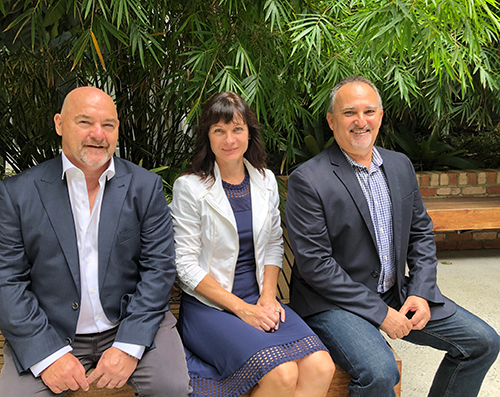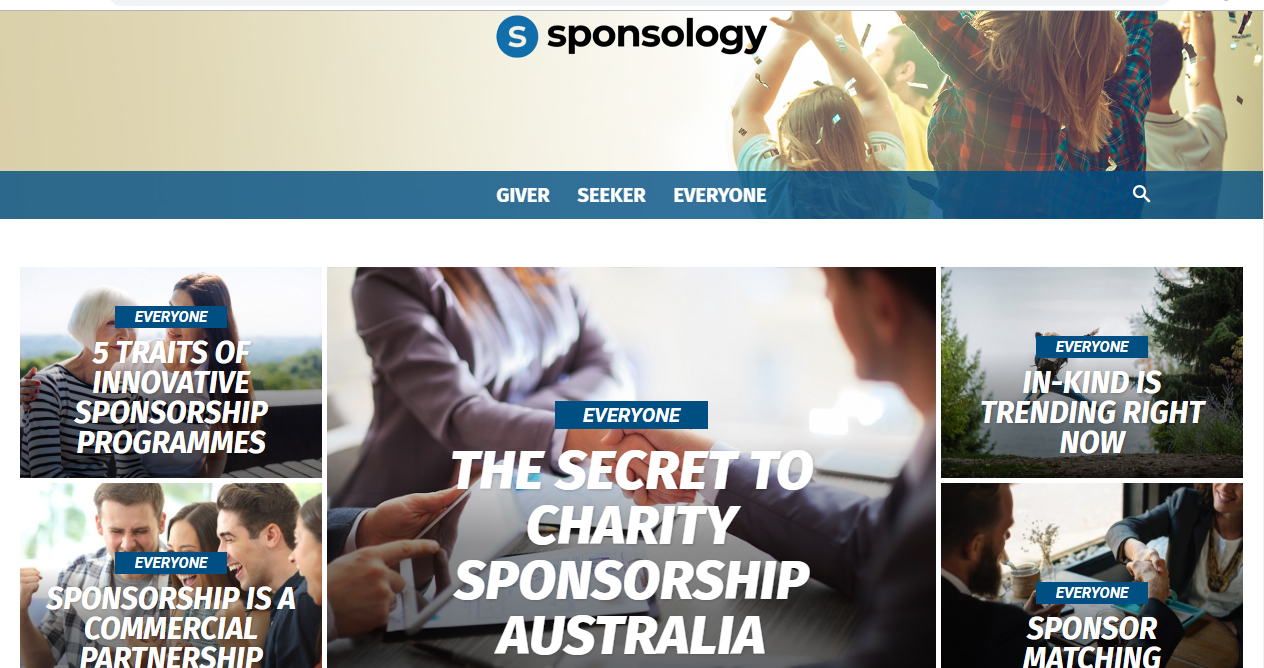Sponsology: a sponsorship and gifting game changer
SPONSOLOGY, a new Australian web platform that uses an algorithm to match sponsorship ‘givers’ and ‘seekers’, is set to change the dynamics of the sector nationally and, potentially, internationally.
The problem Sponsology confronts is matching organisations and individuals, who want to sponsor and donate to specific causes, with charities, not-for-profits (NFPs) and member associations seeking funding or in-kind support. It is a constant quest that currently costs both ‘givers’ and ‘seekers’ an inordinate amount of time and money – often with no outcome as both parties are not aligned.
Sponsology organises the process by logging the intentions of givers and sorting the requests of seekers through a specifically-developed platform. The platform takes into account the nature of the giving and seeking organisations involved, the projects proposed and applies an algorithm.
The result speeds up the matching process creating more accurate introductions based on highly qualified alignment of purpose and outcomes.
Sponsology is the first of four integrated ‘community’ platforms to be launched by its creators, professional sponsorship facilitator Stephen King, founder of a not-for-profit Mark McConnell and intellectual property licensing and trademark attorney Celia Murray. 
The three interlinked areas of the platform to launch over the next few months – Champific for sports people, Bestowly for artists, and Stemdom for researchers and educators – bring organisation to other areas of sponsorship and philanthropy that have been even more haphazard for organisations and individuals to navigate in the past.
“As far as we can tell, this is a world first in terms of matching those who want to give, to certain sectors of the community or to particular causes, with charitable or community organisations that are engaged in that particular work or those particular sectors,” Sponsology co-founder Stephen King said.
“Sponsology is all about collaboration and finding partnerships to facilitate sponsorships and philanthropic giving – and doing it in the most efficient way possible. Givers can even remain anonymous if they choose.
“Up until now, major organisations that operate sponsorship budgets have had to spend a lot of staff time and money in sifting through all the requests they get, just to find those that match their desired causes and areas of special interest,” he said.
“Sponsology saves givers and the seekers time and money by facilitating those matches in a very sophisticated and structured way. It is about making matches that are ideal for both parties – and may possibly never have happened before Sponsology came along.
“Both parties, a giver and a seeker, define their criteria as to where they want to be aligned, who they want to align with, and how they want their organisation to be promoted in the alignment.”
GIVING MORE EFFICIENTLY
Similarly, Mr King said, many givers will be attracted to Sponsology simply because they will not have to engage with seekers directly, if they choose not to. This time and resources-saving aspect of the program is attracting a lot of attention.
“For example, we know of one major car company in Australia that is a well-known sponsor of sport, community services and the arts,” Mr King said. “They currently receive about 1000 proposals a month. They have a team set aside to deal with it, but it is still a tremendous logistical undertaking – and that is without the work they do in seeking out specific sponsorships they may want to initiate as part of their overall strategy.
“Now, this organisation can simply promote on their website, and in their communications, that they use Sponsology to handle sponsorship charity and not-for profit requests. They simply have a Click Here button that puts seekers through to Sponsology and explains what it is all about. The platform does all the work and presents the auto company only with proposals that meet their requirements – and they take it from there, getting in touch with those they are interested in.”
Mr King said an early benefit of Sponsology should be to dramatically reduce staff time dedicated to handling sponsorship requests.
While Sponsology clearly has benefits for large giving organisations and philanthropists, it may also be a solution for small businesses that are also increasingly being asked for donations and sponsorships.
“I asked one coffee shop owner I know about this and his response surprised me,” Mr King said. “He estimated he would spend at least an hour a week dealing with requests from charities. Mostly having to say no.
“With very limited resources in this area he tends to pre-set his charitable donations and stick with those. But he still has to deal with the requests. Now he just directs all requests to join Sponsology and he looks forward to a matched introduction.”
Mr King said businesses with limited resources also often worried that they were not spending their sponsorship funds effectively.
“Because Sponsology is free to givers, this may be a solution for many,” Mr King said. “It is simply a case of setting a budget aside and spending it when the best matches come through. That way you would tend to get better bang for your sponsorship buck while prioritising the causes you care most about.”
Sponsology wants givers to invest more into sponsorship so has made the service free for givers – who can specify precisely what amounts of money or in-kind donations they are offering.
There is a $770-a-year fee for seeker organisations. This gives seekers up to seven proposal matches.
While the seeker pays to participate, Mr King said research into the platform had shown even seekers could save thousands of dollars a year because they were not having to fund extensive research and generic proposal development and the distribution of those proposals.
“From my work in this sector, I know that most organisations seeking substantial support spend thousands of dollars developing major proposals and printing up request documents, mailing them to prospects,” Mr King said. “This is how it happens at the moment and so much of that effort is wasted because the seekers do not know enough about the organisations they approach to match their proposals.
“We know Sponsology can change all that for the better – and the same will be true for other sectors as Champific, Bestowly and Stemdom come through.
“At the end of the day, it is all about finding partnerships in a far more efficient way. It is an area charitable organisations are always struggling with.”

ends

